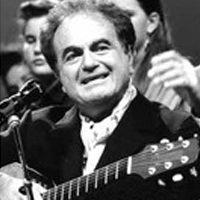He was born Guy Béhart-Hasson in Cairo, Egypt, of Spanish, Swiss, and Russian ancestry. His father’s work as an accountant and business consultant saw the family move frequently, leading to a childhood spent in France, Greece, and Mexico, in addition to Egypt. Between the ages of 10 and 17 his family settled in Lebanon where his interest in music developed to the point that he left for Paris to study at the “École nationale de musique”. In addition to music, he also obtained a degree in engineering.
When his father died in 1952, the young Guy Béhar chose to pursue a career in engineering in order to help support his family, studying at the prestigious École Nationale des Ponts et Chaussées. Simultaneously, however, he enrolled in Paris’s École nationale de musique, studying violin and mandolin, and in his spare time wrote songs and worked the Paris cabaret circuit, where he played guitar and sang under the stage name “Guy Béart”. When a version of one of his songs by a popular performer of the day became a huge success, demand for his writing talents increased and he composed for Juliette Gréco and others. Taken under the wing of renowned music producer Jacques Canetti and fellow musician Boris Vian, he released an album of his own, which won the prestigious Grand Prix de l’Académie du Disque français in 1958.
Normally shy, Béart initially suffered from stage fright and had a very difficult time during his concert debut at the Paris Olympia. His biggest hit came when he wrote the soundtrack of the 1960 motion picture, Girl and the River. The title song of the film is considered a classic of what is known as French chanson. Despite his leap to fame, Béart’s singing career was soon swamped by the rising tide of American rock and roll. However, reinventing himself as a host of a television show featuring musical stars from a variety of genres, he remained in the public eye and eventually made a recording comeback.
In 1963 he and his wife, Geneviève Galea, had a daughter, Emmanuelle, who would grow up to be an actress.
After Béart’s television show ended in 1970, his popularity waned but he continued to record new music that was readily purchased by a loyal following. By the early 1980s he was almost completely out of the spotlight and, although only in his early fifties, he suffered from a number of serious health problems. In 1987, he published a book about his illness entitled Crazy Hope that, combined with his daughter’s success in the blockbuster film Manon of the Spring, brought a resurgence of popularity. More than 25 years after his first appearance at the Paris Olympia, he returned for a series of highly successful performances.
In 1994 Béart was awarded the Grand Prix de l’Académie française in recognition of his achievements over his long career. He continued to perform at a variety of venues around the country and in 1999 did a five-week run at Bobino in Montparnasse that was so popular it allowed for a successful re-release of his double live album recorded at the Olympia.
Now, well into his seventies, he only makes a rare appearance on stage but many of his songs, of which Béart wrote more than 300 himself, are still being purchased by his fans.


10 thoughts on “Kaminos”
Was Nicholas related to Alexander Saslavsky who married Celeste Izolee Todd?
Anyone have a contact email for Yair Klinger or link to score for Ha-Bayta?
wish to have homeland concert video played on the big screen throughout North America.
can organize here in Santa Barbara California.
contacts for this needed and any ideas or suggestions welcomed.
Nat farber is my great grandpa 😊
Are there any movies or photos of max kletter? His wife’s sister was my stepmother, so I’m interested in seeing them and sharing them with his wife’s daughter.
The article says Sheb recorded his last song just 4 days before he died, but does not tell us the name of it. I be curious what it was. I’d like to hear it.
Would anyone happen to know where I can find a copy of the sheet music for a Gil Aldema Choral (SATB) arrangement for Naomi Shemer’s “Sheleg Al Iri”. (Snow on my Village)?
Joseph Smith
Kol Ram Community Choir, NYC
שלום שמעון!
לא שכחתי אותך. עזבתי את ישראל בפברואר 1998 כדי להביא את בני האוטיסט לקבל את העזרה המקצועית שלא הייתה קיימת אז בישראל. זה סיפור מאוד עצוב וטרגי, אבל אני הייתי היחיד עם ביצים שהביא אותו והייתי הורה יחיד בשבילו במשך חמישה חודשים. הוא היה אז בן 9. כעת הוא בן 36 ומתפקד באופן עצמאי. נתתי לו הזדמנות לעתיד נורמלי. בטח, אבות כולם חרא, אומרים הפמינציות, אבל כולם צריכים לעבוד כמטרות במטווחי רובה!
משה קונג
(Maurice King)
Thank you for this wonderful remembrance of Herman Zalis. My late father, Henry Wahrman, was one of his students. Note the correct spelling of his name for future reference. Thank you again for sharing this.
Tirza Wahrman (Mitlak)
amazing zchuso yagein aleinu, he wrote the famous niggun Lefichuch that is sung in almost every Israeli Yeshiva